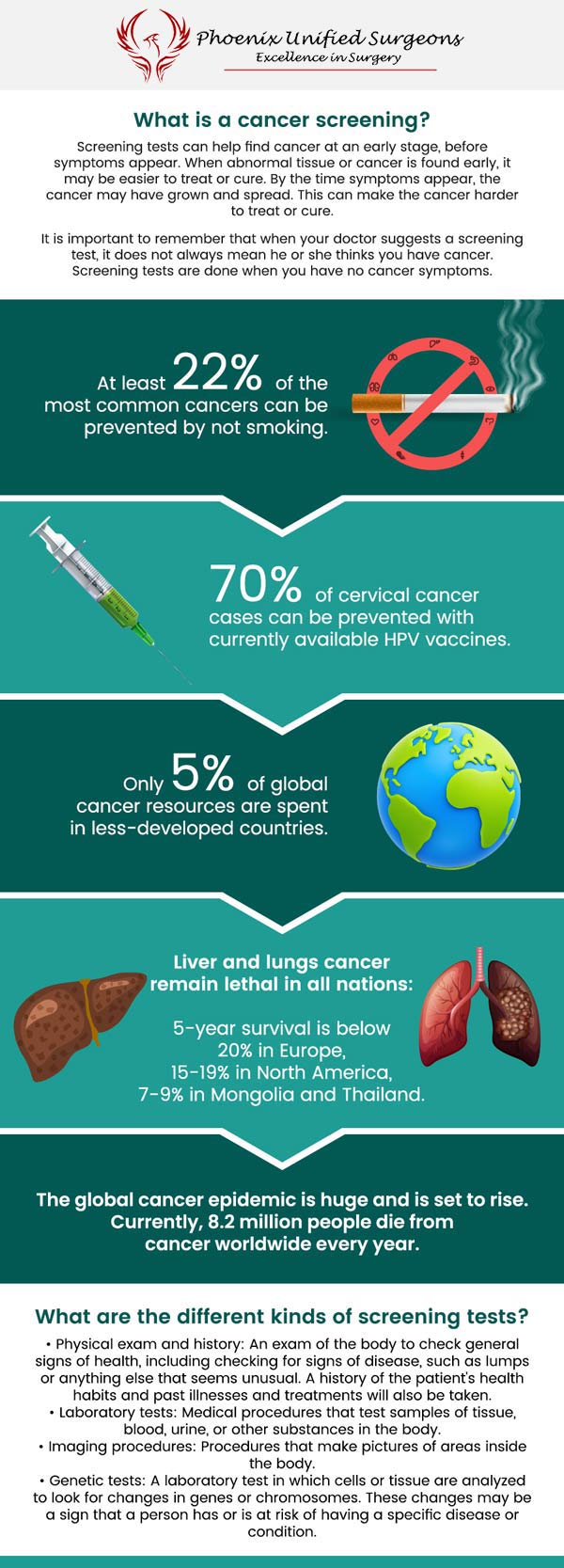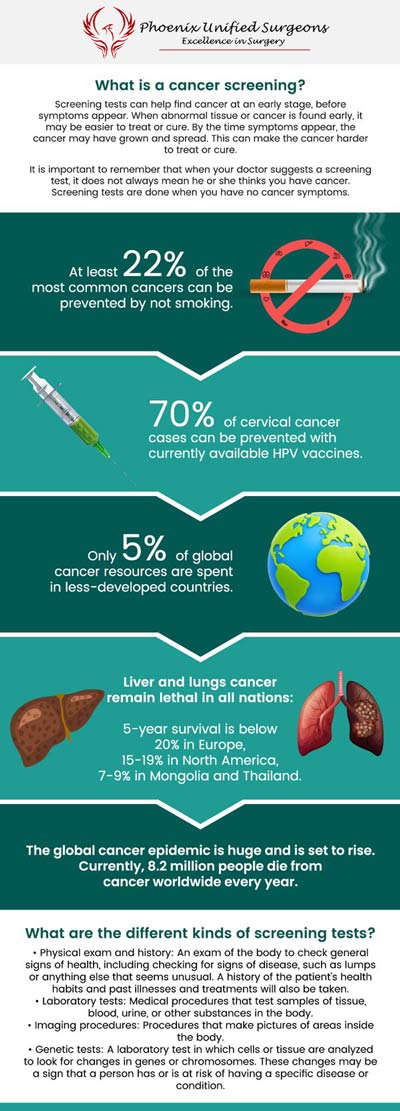Colon Cancer Surgery Specialist in Phoenix, AZ
Symptoms of colon cancer may differ based on the cancer’s size and location. Symptoms may include blood in the stool, stomach pain, and changes in bowel habits such as diarrhea or constipation. Visit Phoenix Unified Surgeons, our board-certified surgeons are committed to providing the greatest surgical proficiency and compassionate assistance. Please contact us or book your appointment online. Our office is conveniently located at 20333 N 19th Avenue, Ste 230 Phoenix, AZ 85027.




Table of Contents:
How fast does colon cancer spread?
Where is colon cancer pain felt?
How to avoid colon cancer?
Recovery after Colon Cancer Surgery
Colorectal cancer (CRC), a prevalent and potentially life-threatening malignancy, presents a significant challenge to human health. This insidious disease unfolds within the colon or rectum, often progressing clandestinely. Early detection is vital because it greatly enhances the effectiveness of treatment outcomes. Staging systems provide a structured approach to understanding the disease’s progression, with Stage 0 signifying a localized cancer confined to the innermost lining, and Stage IV representing widespread dissemination to distant organs. The higher the stage, the more aggressive the cancer and the more complex the treatment course.
Early stages of CRC may be characterized by a slow, localized infiltration of the bowel wall and nearby lymph nodes. Left untreated, the cancer can adopt a metastatic phenotype, disseminating malignant cells through the bloodstream or lymphatic system to colonize distant organs. The rate of dissemination varies considerably, with some cases exhibiting rapid progression, while others manifest as slow-growing malignancies. This highlights the significance of taking proactive steps, such as regular colonoscopies, to identify and address precancerous lesions before they evolve into a more formidable foe. Symptoms like altered bowel habits, unexplained weight loss, and rectal bleeding serve as valuable warning signs, prompting individuals to seek medical evaluation.
However, colon cancer is not an invincible adversary. By understanding its etiology, we can implement strategies to mitigate risk and potentially prevent its development. Both genetic predisposition and lifestyle choices play a significant role in the pathogenesis of CRC. While some individuals may have a higher susceptibility due to family history, modifiable risk factors empower us to take control of our health.
Dietary Considerations:
Dietary habits significantly impact colonic health. Overconsumption of red and processed meats is associated with an increased risk of CRC. These meats often harbor carcinogens and can damage the delicate mucosal lining of the colon, creating a hospitable environment for malignant transformation. Conversely, a diet deficient in fiber, characterized by an abundance of refined carbohydrates and sugary temptations, can similarly elevate risk. Dietary fiber acts as a natural colonic cleanser, promoting efficient elimination of waste products and reducing inflammation.
Physical Activity:
A sedentary lifestyle presents another modifiable risk factor. Physical inactivity leads to weight gain and metabolic disturbances, creating conditions conducive to the development of CRC. Conversely, regular physical activity plays a vital role in preventive strategies. Exercise promotes healthy weight management, facilitates regular bowel movements, and reduces colonic inflammation.
Smoking and Alcohol Consumption:
Smoking and heavy alcohol use are proven risk factors for CRC. The toxic fumes inhaled from cigarettes and the inflammatory effects of alcohol directly damage colonic tissue, increasing susceptibility to cancerous mutations.
Early Detection and Screening:
Regular screening colonoscopies offer a powerful tool for early detection and intervention. These procedures allow for the identification and removal of precancerous polyps before they can develop into cancer. It is especially recommended that individuals with a family history of colorectal cancer undergo regular screenings due to their increased risk.
By adopting a balanced diet rich in fiber, incorporating regular physical activity into our routines, shunning smoking and excessive alcohol consumption, and committing to recommended screening programs, we can significantly decrease the risk of developing colon cancer. These proactive measures empower us to take control of our health and create a future where this potentially devastating disease is no longer a significant public health threat.
Colon cancer originates as minuscule benign lesions called polyps. Over time, these deceptively inconspicuous growths can morph into cancerous entities, their presence often veiled from unsuspecting hosts.
Abdominal discomfort serves as a telltale sign that cancer’s tendrils have begun to spread within the colon. This pain manifests in a myriad of ways, from a gnawing dull ache to a sharp, piercing torment. Frequently, it takes up residence on the left side of the abdomen, but can also establish its presence on the right or reside in the center, mimicking the innocuous throes of indigestion. It’s crucial to heed the persistent nature of this pain and seek medical attention if its intensity escalates.
Beyond abdominal distress, colon cancer casts a wider net of symptoms. Alterations in bowel function become apparent, with diarrhea or constipation reigning supreme. Stools may become narrow and stubbornly resistant to evacuation. Blood seeping into the stool is a crimson flag that cannot be ignored. Weight loss, unexplained fatigue, and rectal bleeding also join the ominous procession of symptoms. Gas, bloating, and anemia, if unexplained, should raise suspicion.
If abdominal pain intertwines with any of these sinister signs, it’s imperative to seek immediate medical intervention. Early detection holds the key to successful treatment, a precious opportunity to strike while the cancer is still vulnerable. By heeding the whispers of your body and consulting a physician promptly, you can illuminate the shadows cast by colon cancer and empower yourself with the knowledge that leads to triumph.
Colorectal cancer (CRC) is a prevalent and potentially life-threatening malignancy, it is the third leading cause of cancer-related mortality in the United States. However, with a focus on preventive measures and early detection, individuals can significantly decrease their risk of developing this disease.
Early Detection Through Screening:
Regular screening of colonoscopies is a cornerstone of CRC prevention. This minimally invasive method enables the authentication and removal of precancerous polyps before they have the opportunity to progress to cancer. The American Cancer Society advises that those with average risk start screening at the age of 45. However, a personalized approach is necessary. Individuals with a family history of CRC or other risk factors may benefit from earlier or more frequent tests. Additionally, stool tests offer alternative screening options. Contact a medical professional to help evaluate the most appropriate screening strategy for each patient.
Lifestyle Modifications:
Beyond screening, adopting a healthy lifestyle plays a crucial role in CRC prevention. A fiber-rich diet, which includes fruits, vegetables, and whole grains, promotes digestive health and reduces the risk of CRC. These foods are also rich in antioxidants, which protect cells from damage. Conversely, limiting red and processed meats is essential, as they have been linked to an increased risk of CRC.
Regular physical exercise, for example, 30 minutes of moderate activity most days of the week, strengthens the body’s defenses against CRC. Exercise promotes weight management, reduces inflammation, and overall improves health.
Quitting smoking is vital since it dramatically increases the risk of CRC. Furthermore, restricting alcohol consumption is suggested, since excessive alcohol intake has also been linked to an increased risk of CRC.
Conclusion:
By combining a commitment to regular screening with a healthy lifestyle, individuals can significantly decrease their risk of developing CRC. Prevention is the ultimate goal, allowing individuals to take control of their health and well-being.
The recovery time following CRC surgery varies depending on the individual and the surgical approach employed. Typically, the recovery period spans around 6 weeks, with an initial hospital stay of 3 to 7 days for pain management and monitoring.
Variations in Surgical Techniques and Recovery:
Laparoscopic surgery offers a minimally invasive approach, resulting in a shorter recovery time (approximately 1-2 weeks) with minimal pain that subsides within days. Open surgery, while more invasive, may be necessary in certain cases. Open surgery recovery is estimated to take 4-8 weeks, with more pronounced pain and potentially requiring assistance with daily activities.
Recovery Milestones:
Most individuals can resume light activities within 2-4 weeks after surgery. Return to work varies depending on job demands and may take 4-8 weeks or longer. Complete recovery may extend for several months or longer.
Navigating Recovery:
After surgery, prioritize rest and avoid vigorous exercise. Gentle walking is encouraged to promote healing. Adhere to scheduled follow-up appointments, maintain a balanced diet, and stay well-hydrated. Some patients may require additional treatments like chemotherapy, which can prolong recovery. Always follow your healthcare provider’s instructions.
Monitoring and Reporting:
Report any unusual occurrences, such as fever or severe discomfort, to your doctor promptly. Remember, recovery is a unique process for each individual. With proper care, most individuals experience significant improvement within a few months.
By diligently following medical advice and attending appointments, patients can regain their health and well-being.
Colon cancer surgery is available at Phoenix Unified Surgeons in Phoenix, AZ. Please contact us or book your appointment online. Our office is conveniently located at 20333 N 19th Avenue, Ste 230 Phoenix, AZ 85027. We serve patients from Phoenix AZ, Sun City AZ, Peoria AZ, Surprise AZ, Glendale AZ, Scottsdale AZ, and surrounding areas.
Check Out Our 5 Star Reviews



Additional Services You May Need
▸ Colon & Rectal Surgery
▸ Gallbladder Surgery
▸ Colonoscopy
▸ Wound Care
▸ Hernia Repair
▸ General Surgery
▸ Robotic and Minimally Invasive Surgery
▸ Appendectomy
▸ Colon Repair/Resection
▸ Lipoma & Cyst Removal
▸ Endoscopy and Colonoscopy
▸ Abdominal Pain
▸ Colon surgery for Diverticulitis
▸ Colon surgery for Colon Cancer
▸ Hemorrhoids
▸ Anal Fistulas
▸ Anal Pain Surgeries
▸ Colostomy Avoidance Surgery
▸ Fecal Incontinence Surgery
▸ Crohn’s Surgery
▸ Ulcerative Colitis Surgery






